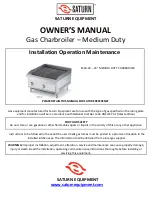
10
Installation and Servicing
Section 1 - General
1.10 WATER CIRCULATION SYSTEM
IMPORTANT
A minimum length of 1 metre of copper pipe
MUST be fitted to both flow and return connections from the
boiler before connection to any plastic piping.
The central heating system should be in accordance with
BS6798 and, in addition, for smallbore and microbore systems,
BS EN 12831 and BS EN 14336.
Water treatment is covered later in these instructions.
Refer to Section
1.21
1.11 BOILER CONTROLS
Install controls to ensure that the boiler has no demand when
there is no requirement from the system.
Heating systems with TRVs in individual rooms must include a
thermostat to control the temperature in rooms without TRVs.
At least 10% of the minimum boiler heat output should be
achieved using a room thermostat. A bypass circuit with an
automatic bypass valve must be fitted to systems with TRVs or
two-port valves on all the radiators to ensure water flow.
1.12
ELECTRICAL SUPPLY
Wiring external to the appliance MUST be in accordance with
the current I.E.E. (BS7671) Wiring Regulations and any local
regulations which apply.
The mains supply to the boiler and system wiring centre
shall be through one common fused double pole isolator and
for new heating systems, and where practical replacement
installations, the isolator shall be situated adjacent to the
appliance.
1.13
CONDENSATE DRAIN
The condensate drain provided must be connected to the
drainage point on site. All condensate drainage pipework and
fittings must be made of plastic
.
IMPORTANT:
All pipework should be installed in
accordance with BS6798.
The drain outlet on the boiler is sized for standard 21.5 mm
overflow pipe. It is a universal fitting to allow use of different
brands of pipework.
Refer to Section
2.20
1.9 GAS SUPPLY
Consult the local gas supplier to establish an adequate supply
of gas. Do not use existing service pipes without consulting the
local gas supplier.
The gas supply must be governed with a meter.
A gas meter can only be connected by the local gas supplier or
a Gas Safe Registered Engineer.
An existing meter should be checked, preferably by the gas
supplier, to ensure that the meter is adequate to deal with the
required gas supply rate.
It is the responsibility of the Gas Installer to size the gas
installation pipework in accordance with BS6891.
Whilst the principle of the 1:1 gas valve ensures the Logic
range is able to deliver it is full output at inlet pressures as low
as 14 mb, other gas appliances in the property may not be as
tolerant. When operating pressures are found to be below the
minimum meter outlet of 19 mb these should be checked to
ensure this is adequate for correct and safe operation.
Allowing for the acceptable pressure loss of 1mb across the
installation pipework, it can be assumed that a minimum
permitted operating pressure of 18mb will be delivered to the
inlet of the appliance.
(Reference BS6400-1 Clause 6.2 Pressure Absorption).
The external gas cock could further reduce the operating
pressure when measured at its test point. The pressure drop
is relative to the heat input to the boiler (kW), refer to graph
below.
Gas Cock Pressure Drop
Heat Input to Boiler (kW)
Pressure Drop (mbar)
0 5 10 15 20 25 30 35 40
1.4
1.2
1
0.8
0.6
0.4
0.2
0
IMPORTANT
Ensure all gas valve connections are gas
tight with a gas soundness check up to the gas control valve.
Installation pipes must be fitted in accordance with BS6891.
The complete installation MUST be tested for gas tightness
and purged as described, for the majority of installations the
appropriate standard is IGEM/UP/1B [23], but alternatively
IGEM/UP/1 [21] or IGEM/UP/1A [22], as appropriate, can be
utilized.
WARNING:
This appliance must be earthed











































